|
|
 Jen Jen |
|
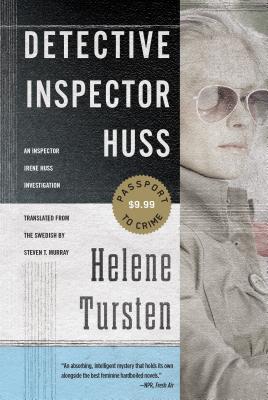
|
|
Detective Inspector Huss
Helene Tursten
I discovered a new crime writer! Helene Tursten is a Swedish author who writes the Irene Huss Investigation series. I’m reading book #1 in the series, Detective Inspector Huss. A prominent citizen jumps off a balcony in what appears to be suicide, but in fact was a homicide made to look like suicide. Huss and her team find themselves among the undesirables, including neo-Nazis, to find the killer. I enjoyed the perspective of a female investigator working in a country unfamiliar to me and look forward to devouring the whole series! |
| |
|
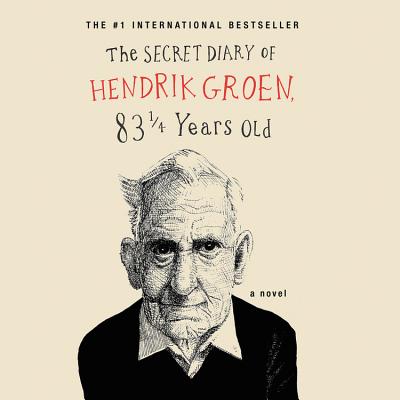
|
|
The Secret Diary of Hendrik Groen
Hendrik Groen
I listened to The Secret Diary of Hendrik Groen as an audio book on libro.fm. I’m a sucker for curmudgeons, and this book was right up my alley. Hendrik Groen, aged 83¼, decides to write a secret expose that will out the goings-on at his retirement home. (It is Hendrik’s hope that he will die before his best friend Evert does so that Evert will have the honor of reading juicy passages from Hendrik’s writing at Hendrik’s funeral.) With his friends, an Old-But-Not-Dead Club is formed, complete with rules such as No Whining. The no-nonsense director of the retirement home is a thorn in everyone’s side, which makes her the perfect target for goading. I’m glad I listened to this book, as the pleasure of Hendrik’s company lasted longer than if I’d read a print book! |
| |
|
|
|
|
| |
|
| We’re coming into the season when publishers, with an eye to Christmas, will begin releasing big titles. Hannah reviews one of these, Shell Game, below, and I review three here. And a piece of trivia for you: the big releases are always on Tuesdays. |
|
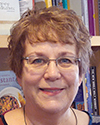 Sally Sally |
|
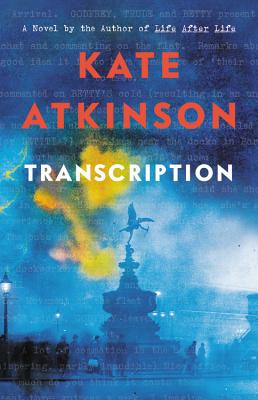
|
 |
Transcription
Kate Atkinson
Atkinson’s (Behind the Scenes at the Museum and Life After Life) latest novel is a traditional spy story, with all its conventions—double agents, assumed identities, and hidden recording devices.
In 1940, Juliet Armstrong was an 18-year-old orphan who had received a good education when M15 (the British Security Service) enlisted her in the wartime effort to thwart the Germans. M15 had side by side flats in an apartment building in London. One was used by Godfrey Toby for conversations with fifth columnists (British Nazi sympathizers.) Next door, engineers recorded the conversations, using microphones hidden in the walls, and Juliet transcribed them. At one point, Juliet infiltrated the social circle of another member of the fifth column. There’s a great deal of tedium in Juliet’s work as well as frustration as she tries to make sense of recordings of poor quality. There’s also a great deal of humor in her private reflections on events in her life.
Ten years after the war, Juliet worked as a producer for educational programming for the BBC, and assumed that her wartime experiences were a part of the past. However, an anonymous note (“you will pay for what you did”) and the sense that she is being followed lead to revelations about both the present and the past, and a huge consequence for Juliet.
Atkinson’s skill as a storyteller makes it all work! Earlier this year, I read Warlight, by Michael Ondaatje, which also was about British spies during and after World War II. The books are very different, but it was interesting to pair them.
This book was released September 25.
|
| |
|
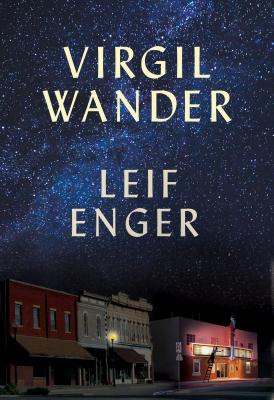
|
|
Virgil Wander
Leif Enger
In Greenstone Minnesota, a struggling town vaguely north of Duluth, Virgil Wander has struggles of his own. Shortly before the beginning of the book, Virgil and his car left the road under ambiguous circumstances, plunging into Lake Superior. Virgil was rescued by a quick-thinking passerby, but doesn’t quite feel like himself yet. His roles in Greenstone, as proprietor of the Empress, the local movie theater, and as town clerk, put him in contact with seemingly all the citizens of the town. Soon, he’s invited Rune, a kite-making and flying Norwegian on a quest, to stay with him, and is balancing suddenly ambitious plans for a local festival, the enigmatic Adam Leer, a possibly homicidal sturgeon, and the lives of a number of his neighbors. It’s all just short of incredible and improbable, and is totally wonderful.
Here's a link to the feature article about Leif Enger recently published in the StarTribune.
The book will be released on October 2: and Leif Enger will be coming here on Decembeer 1!
|
| |
|
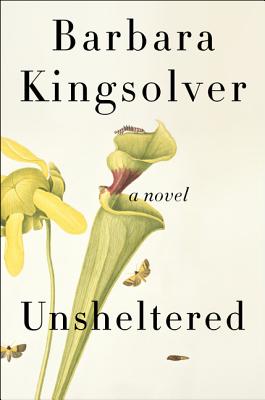
|
|
Unsheltered
Barbara Kingsolver
Barbara Kingsolver is an author with an acute social conscience and is a heck of a storyteller. Both are on display in her newest book, Unsheltered, She says of the book, “We’re living through a paradigm shift—a time when we have to question some basic assumptions about how we live. Unsheltered speaks to this moment and asks where we might be headed.”
Unsheltered is the story of two families who live on the corner of Sixth and Plum in Vineland New Jersey, two centuries apart, but both in times of major cultural shifts.
The contemporary family, the Knoxes, have inherited a rundown house at a time of great stress in their lives. After years of responsible middle class life, Willa and Iano have lost their jobs, and are nearly destitute while responsible for Iano’s father, their grown children, and a grandchild.
Willa begins researching the history of the house, hoping that it will be noteworthy enough that the local historical preservation society will take an interest in funding the necessary repairs.
She discovers a kindred spirit named Thatcher Greenwood lived in the house in the 1880’s. Greenwood was a science teacher, forbidden by his school to speak of the theories recently published by Charles Darwin. His friendship with the brilliant scientist next door and clashes with the town’s powerful leaders led to problems with his new wife and social climbing mother-in-law.
The book’s chapters alternate between Willa and Thatcher, each living in precarious times, similar to our own. Kingsolver fans won’t want to miss this book!
The book will be available October 16. The copies we’ll have in the store are a special edition, available only at indie bookstores, which include a letter from Barbara Kingsolver.
|
|
|
|
|
|
|
| |
|
|
|
|

Ann
|
|
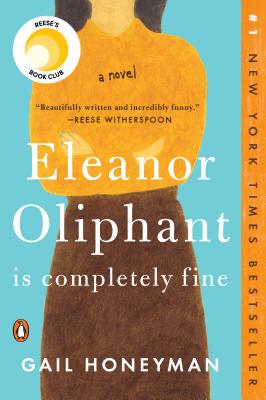
|
|
Eleanor Oliphant is Completely Fine
Gail Honeyman
Eleanor Oliphant is in her late twenties. She works in an office where her co-workers tolerate her but wouldn't be considered friends. Eleanor lives alone and is quite rigid in her routines. Other than her time at the office, she is isolated.
Life begins to change for Eleanor when Raymond, the IT guy at work, comes into her life. When they first meet, Eleanor finds plenty not to like about Raymond. Slowly, as he chips away at her defenses, their friendship grows and Eleanor's world enlarges. Eleanor could be described as quirky. She is also funny and tries bravely to get through her days as best she can. As her world gradually expands, Eleanor begins to develop trust. She slowly begins dealing with traumatic childhood experiences that she has all but erased from her memory and to experience self-acceptance and happiness in her life. Eleanor's story is heartbreaking in many ways but is ultimately heart warming and hopeful. I'm very glad that I read this book.
|
| |
|
|
|
|
|
| |
|
|
|
|

Bob |
|
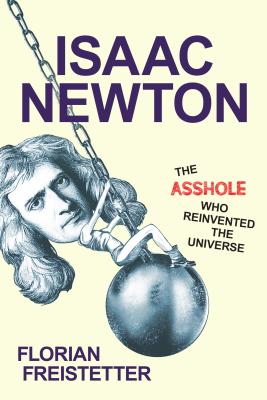 |
|
Isaac Newton: The Asshole Who Reinvented the Universe
Florian Freistetter
As I sat down to write my review of this book, I had to stop with the title. Normally the title is just the title (no matter how bad) and you write it down. But there are many gentle Minnesotans who read these reviews (at least two) and who am I to offend? So I thought of medical terminology…The Rectum Who Reinvented the Universe. No, that sounds like a space aliens horror book (imagine the cover art.) The A**hole who Reinvented…? No that’s kind of lame, plus you’re not fooling anyone over the age of 8. Just go with what’s written, and if you’ve made it this far you’re less fragile than you thought.
I really liked reading this book because of the style in which it was written, and then I realized it was like a class I took in college called History of Science. That was a great class because it explained what science was like during a certain era……what was available at the time (no sporks yet), what people knew, and how religious factions influenced how people were “supposed” to believe. Well, that’s the style in which this book is written, only it centers around Sir Isaac Newton. You know, the guy that came up with the idea of gravity after being hit on the head by an apple while sitting under an apple tree. He was a very intelligent, somewhat introverted scientist from the 1600’s, with a few friends. Basically, a Nerd. Hmm, maybe that’s why I enjoyed reading it? The author doesn’t just stick to that era but makes comparisons between how science got done in the late 1600’s and how scientific discoveries are handled today. For example, Newton discovered Calculus and then stuffed it in a drawer for a couple decades. In contrast, today every new mathematical “idea” is published to the hilt while the conceptual ink is still wet.
The book is a quick read of a couple hundred pages with lots of interesting sections in the back (references, notes, important dates, even a suggestion of a 900 page book on Newton (which will NOT be reviewed here.) The book is also an easy read, not bogged down by technical terminology or concepts. Actually, you may be surprised in all the different areas Newton studied/dabbled in. You don’t have to be a nerd to enjoy this book! |
| |
|
|
|
|
|

Gail |
|
 |
|
|
| |

|
|
The Song Poet: A Memoir of my Father
Kao Kalia Yang
As the Vietnam war draws to a close in Laos, the Chinese communists begin to hunt down and kill the Hmong people as they had helped the Americans during the war. The author's father and mother barely escape with their lives. They spend 8 years in a refugee camp in Thailand. Finally, they are able to come to the U.S. and settle in the Hmong community in St. Paul. End of story and all is great! Not so, as the Yang family find many challenges: learning the language, how to get from one place to another, finding jobs with wages high enough to make ends meet, bullies and prejudice in the schools and the workplace. Kalia's parents do not give up and instill in their children a love of learning and a pride in their new country. The author has a beautiful way with words and one feels the ups and downs right along with the family. I was fortunate to meet the author's parents when she came to Sister Wolf Books in Dorset to talk about her first book, The Latehomecomer. Since the Hmong are our close neighbors I feel it's important to know their stories and learn to live together with respect for all.
|
| |
|
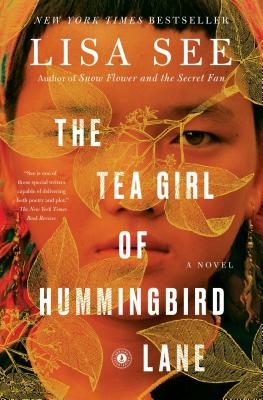
|
|
The Tea Girl of Hummingbird Lane
Lisa See
Li-Yan grows up in a small isolated village in China. Her mother, Ama, is the village mid-wife and healer. Ama has inherited some very special tea trees from her mother. These will eventually go to Li-Yan. As tea becomes popular, not only does the demand increase but also the price. Outside civilization begins to invade the village and the customs and century old taboos come into question. The author is a Chinese-American and has written a number of fictional accounts of life in China. Snowflower and the Secret Fan is probably the best known. Our book club felt that The Tea Girl of Hummmingbird Lane was not See’s best book, but discussion was lively as we talked about the taboos surrounding the birth of twins. adoption of children from the viewpoints of both parents and the child, and also the fascinating business of growing, selling and drinking tea. |
| |
|
|
|
|
|
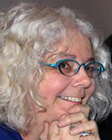
Hannah |
|
 |
|
|
|
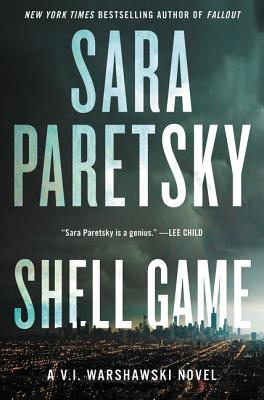
|
|
Shell Game
Sara Paretsky
Paretsky says that she loves writing about characters far more than developing plots, but you wouldn’t guess that from reading Shell Game. Of course detective V.I. Warshawski and her friends and enemies are great to spend time with. But this novel starts out with two totally unrelated mysteries, both concerning people V.I. has personal reasons to care about. It’s hard to imagine how Paretsky will be able to resolve this complex story. She does it beautifully.
The plot centers around timely immigration issues, and delves into the world of archeology: Chicago’s hallowed Oriental Institute is featured. The Russian mob is involved. AND northern Minnesota and the Anishinaabe play a role. See what I mean about her plot?
Shell Game will be released October 16.
Paretsky’s website includes this little video created by University of Chicago students, a fun introduction to Warshawski as a young woman.
|
| |
|
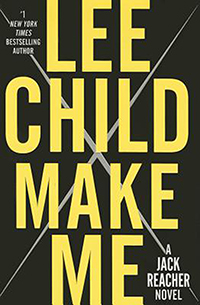
|
|
Make Me
Lee Child
Reacher: modern day Paladin, I wish you were real! If you've seen the movies, you don't know Reacher. First, Tom Cruise is ridiculous casting for a man who is extremely large, and frequently uses his size. Second, much of the fun of Reacher comes from the things going on in his head, including calculating how to do hand-to-hand combat. Make Me, a recent book in the series of 23 Reacher novels, is a good example.
There’s a Lee Child quote on the cover of Shell Game: “Sara Paretsky is a genious.”
|
| |
|
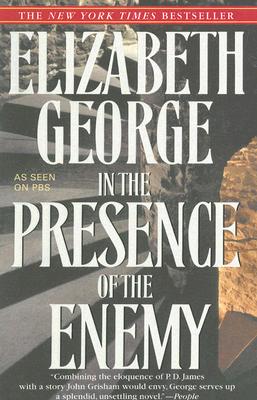
|
|
In the Presence of the Enemy
Elizabeth George
Don't you love it when a friend introduces you to a great mystery writer, thereby giving you multiple books to look forward to? George is my newest such discovery. A child is kidnapped: her mother, a rising Tory politician, refuses to meet the kidnapper's demand that the natural father, editor of a sleazy tabloid, be revealed. I thought I guessed Who Done It on about page 455, but I was only partly right.
 One book leads to another: George's Traitor to Memory is even better. It features a violin prodigy and a hit-and-runner murderer. One book leads to another: George's Traitor to Memory is even better. It features a violin prodigy and a hit-and-runner murderer.
 And another: Careless in Red, featuring surfing in Cornwall. (What?! Surfing in Great Britain?) It takes a while to sort out the many characters but it's worth it. This book is also about the difficulty of parenting adolescents, and the several subplots are intelligent and resolve well. And another: Careless in Red, featuring surfing in Cornwall. (What?! Surfing in Great Britain?) It takes a while to sort out the many characters but it's worth it. This book is also about the difficulty of parenting adolescents, and the several subplots are intelligent and resolve well.
Note: When Sally saw I was reviewing these books she advised me to read this series in chronological order. So I'm sharing that advice with you!
|
| |
|
|
|
|
|
| |
|
|
|
|

Tim |
|
 |
|
Fear: Trump in the White House
Bob Woodward
I read Fear with the expectation that all of my own fears would be borne out, and this was true, in spades. This author is Bob Woodward, an associate editor of the Washington Post, where he has worked for 47 years. He won a Pulitzer Prize (the first of two) for his coverage, with Carl Bernstein, of the Watergate scandal. Well researched and documented, this is the 18th book produced by a writer who has made his place in the history of this nation, as perhaps the premiere truth teller. If you want to know what was said, and who said it, read this book! |
Would you like to be a guest reviewer?
Email Sally at sally@beagleandwolf.com |
| |
|
|
|
|
|
— page top —
|
|

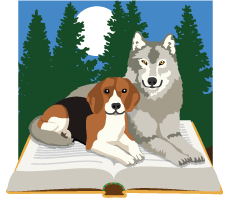

 Jen
Jen
 Sally
Sally















